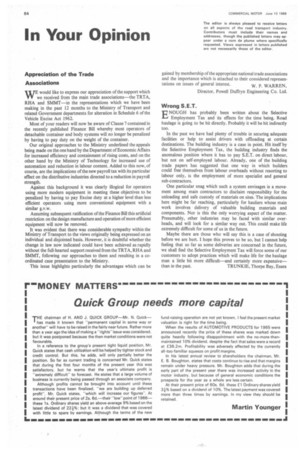In Your Opinion
Page 66

If you've noticed an error in this article please click here to report it so we can fix it.
Appreciation of the Trade Associations
would like to express our appreciation of the support which we received from the main trade associations—the TRTA, RHA and SMMT—in the representations which we have been making in the past 12 months to the Ministry of Transport and related Government departments for alteration in Schedule 6 of the Vehicle Excise Act 1962.
Most of your readers will now be aware of Clause 7 contained in the recently published Finance Bill whereby most operators of detachable container and body systems will no longer be penalized by having to pay duty on the weight of the container.
Our original approaches to the Ministry underlined the appeals being made on the one hand by the Department of Economic Affairs for increased efficiency and containment of rising costs, and on the other hand by the Ministry of Technology for increased use of automation and reduction in labour content. Added to this now, of collie, are the implications of the new payroll tax with its particular effect on the distributive industries directed to a reduction in payroll strength.
Against this background it was clearly illogical for operators using more modern equipment in meeting these objectives to be penalized by having to pay Excise duty at a higher level than less efficient operators using more conventional equipment with a similar g.v.w.
Assuming subsequent ratification of the Finance Bill this artificial restriction on the design manufacture and operation of more efficient equipment will now be removed.
It was evident that there was considerable sympathy within the Ministry of Transport to the views originally being expressed on an individual and disjointed basis. However, it is doubtful whether the change in law now indicated could have been achieved as rapidly without the full-hearted support received from the TRTA, RHA and SMMT, following our approaches to them and resulting in a coordinated case presentation to the Ministry.
This issue highlights particularly the advantages which can be
gained by membership of the appropriate national trade associations and the importance which is attached to their considered represen tations on issues of general interest. W. P. WARREN,
Director, Powell Duffryn Engineering Co. Ltd.
Wrong S.E.T. rNOUGH has probably been written about the Selective Employment Tax and its effects for the time being. Road haulage is going to be hit directly. Probably it will be hit indirectly too.
In the past we have had plenty of trouble in securing adequate facilities or help to assist drivers with offloading at certain destinations. The building industry is a case in point. Hit itself by the Selective Employment Tax, the building industry finds the anomalous position where it has to pay S.E.T. on direct labour, but not on self-employed labour. Already, one of the building trade papers has suggested that one way in which builders could free themselves from labour overheads without resorting to labour only, is the employment of more specialist and general sub-contractors.
One particular snag which such a system envisages is a movement among main contractors to disclaim responsibility for the unloading and safe custody of materials on sites. The implications here might be far reaching, particularly for hauliers whose main work involves delivery of valuable building materials and components. Nor is this the only worrying aspect of the matter. Presumably, other industries may be faced with similar overheads, and will look for a similar way out. This could make life extremely difficult for some of us in the future.
Maybe there are those who will say this is a case of shouting before we are hurt, I hope this proves to be so, but I cannot help feeling that so far as some deliveries are concerned in the future, we shall find the Selective Employment Tax will force some of our customers to adopt practices which will make life for the haulage man a little bit more difficult—and certainly more expensive—
than in the past. TRUNKIE, Thorpe Bay, Essex




























































































































